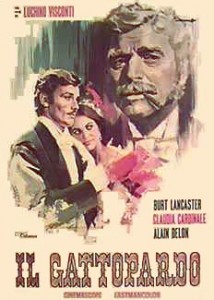“The Leopard”: epic in every sense of the word
Back in November, Jim & I were lucky enough to catch a revival screening of Luchino Visconti’s 1963 film “The Leopard” at the Charles. Since I occasionally play excerpts from the film’s soundtrack (fabulous work by Nino Rota, with a little help from Verdi) on WBJC & am a longtime fan of old movies, I’d wanted to see it for years. Jim & I have pretty similar taste in cinema, so he didn’t balk at the thought of spending a good chunk of a Saturday watching a very long movie that’s nearly five decades old.
The print we saw was stunningly gorgeous – Martin Scorsese & Gucci were instrumental in the film’s recent restoration – but good looks alone won’t save a three-hour movie from being a bore if it’s dated. Fortunately, “The Leopard” has held up very well over the decades in terms of script, acting, direction, & visuals – with regard to the latter, the attention to period detail is so remarkable that the film seems to consist of a series of 19th-century paintings come to life. Between the two of us, Jim & I know a bit about history, architecture, & fashion, & neither noted any glaring anachronisms – a rare occurrence! The story is well-paced & the script, in which director Visconti had a hand, is very moving, but also quite witty at times.
“The Leopard” is based on Giuseppe Tomasi de Lampedusa’s novel of the same name. The film takes place in the early 1860’s, during the Risorgimento. Prince Don Fabrizio Salina, the main character, is concerned not only about political events, but also with his noble Sicilian family’s place in a rapidly changing world. I received a copy of the novel from my Secret Santa (thanks again, Steph!) & devoured it during the holidays – a great read, & I am pleased to say the film is very true to the novel, although I found the latter considerably more cynical. If you’re looking for an intelligent film or book to pass some time with on a cold winter’s night, I’d highly recommend both versions of “The Leopard.”
Tags:acting, history, movies, politics, Verdi





